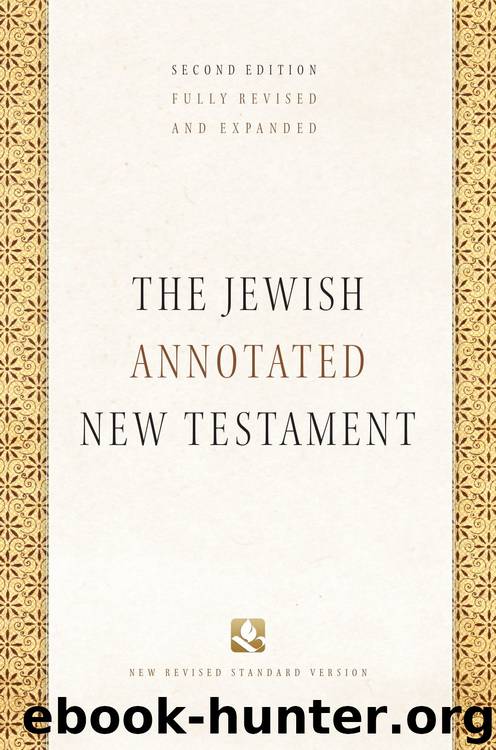The Jewish Annotated New Testament by Amy-Jill Levine & Marc Zvi Brettler

Author:Amy-Jill Levine & Marc Zvi Brettler [Levine, Amy-Jill & Brettler, Marc Zvi]
Language: eng
Format: epub
ISBN: 9780190461850
Publisher: Oxford University Press
Published: 2017-07-11T00:00:00+00:00
1.1–2: Salutation. Colossians mimics Paul’s salutation formula. 1: Apostle, lit., “one sent” (cf. Heb “shaliaḥ”). Timothy, all of Paul’s own letters except Romans have multiple senders; Timothy, listed as co-sender of all except Galatians, is mentioned by Paul more frequently than any other person except Jesus. See Acts 16. Timothy was so prominent in the post-Pauline churches that the Pastoral Epistles of 1 and 2 Timothy are addressed to him. Brother, an address for unrelated members of several religious communities: Josephus, J.W. 2.122, refers to the Essenes as “brothers” (Gk “adelphoi”); followers of the Greco-Egyptian god Serapis (Paris Papyrus [second century bce] 20). 2: Saints, lit., “holy ones,” Paul’s most common designation for Jesus’ followers; the term is more frequent in Ephesians and Colossians than in Paul’s own letters. Brothers and sisters, the plural of the Gk for “brother” (“adelphos/adelphoi”) may refer to “brothers and sisters” (see translators’ note a). Colossae, city in modern Turkey in the Lycus valley, east of Ephesus, substantially destroyed by an earthquake in 60 ce. Grace … peace, Paul adapted the standard Greek letter greeting (“chairein,” “greetings”) to the similar-sounding theological term “charis,” “grace,” and included the Jewish epistolary greeting “shalom,” “peace” (Gk “eirēnē”) (e.g., Ezra 5.7). Ephesians and the Pastoral Epistles follow the same practice. From God our Father, the Tanakh rarely addresses God as father, preferring “God of our ancestors” [“Fathers”], although see Isa 63.16; Ps 89.26. The usage is known, but not common, at Qumran (see 4Q460, Heb “ʾavi vaʾadoni,” “my father and my lord”) and becomes increasingly common in rabbinic literature: most frequent is the address of God as both “father and king” (Heb “avinu malkeinu,” e.g., b. Taʾan. 25b). God is only addressed twice as “father” in the LXX, both times in the Book of Odes ch 14; much more common is the phrase “God of [our] ancestors/fathers” (Gk “theos paterōn,” i.e., Ex 3.13). The phrase occurs in all of Paul’s own letters, the Deutero-Pauline letters, and the Pastoral Epistles.
Download
This site does not store any files on its server. We only index and link to content provided by other sites. Please contact the content providers to delete copyright contents if any and email us, we'll remove relevant links or contents immediately.
The Power of Habit by Charles Duhigg(3128)
Man's Search for Meaning by Viktor E. Frankl(2669)
Mckeown, Greg - Essentialism: The Disciplined Pursuit of Less by Mckeown Greg(2437)
MOSES THE EGYPTIAN by Jan Assmann(2411)
Devil, The by Almond Philip C(2324)
The Complete Dead Sea Scrolls in English (7th Edition) (Penguin Classics) by Geza Vermes(2277)
Unbound by Arlene Stein(2268)
I Capture the Castle by Dodie Smith(2034)
Schindler's Ark by Thomas Keneally(1879)
The Invisible Wall by Harry Bernstein(1799)
The Gnostic Gospel of St. Thomas by Tau Malachi(1793)
The Bible Doesn't Say That by Dr. Joel M. Hoffman(1676)
The Secret Doctrine of the Kabbalah by Leonora Leet(1604)
Political Theology by Carl Schmitt(1577)
The Jewish State by Theodor Herzl(1533)
A History of the Jews by Max I. Dimont(1529)
The Dead Sea Scrolls Bible by Martin G. Abegg(1513)
The Book of Separation by Tova Mirvis(1485)
Oy!: The Ultimate Book of Jewish Jokes by David Minkoff(1369)
